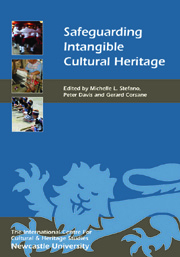Book contents
- Frontmatter
- Contents
- List of Illustrations
- Acknowledgments
- Touching the Intangible: An Introduction
- NEGOTIATING AND VALUING THE INTANGIBLE
- 1 The Paradoxes of Intangible Heritage
- 2 Memory, Museums and the Making of Meaning: A Caribbean Perspective
- 3 From Intangible Expression to Digital Cultural Heritage
- 4 Conversation Piece: Intangible Cultural Heritage in Sweden
- 5 Africa's Rich Intangible Heritage: Managing a Continent's Diverse Resources
- 6 The Silence of Meanings in Conventional Approaches to Cultural Heritage in Jordan: The Exclusion of Contexts and the Marginalisation of the Intangible
- 7 Conversation Piece: Intangible Cultural Heritage in India
- APPLYING THE INTANGIBLE CULTURAL HERITAGE CONCEPT
- ON THE GROUND: SAFEGUARDING THE INTANGIBLE
- List of Contributors
- Index
2 - Memory, Museums and the Making of Meaning: A Caribbean Perspective
from NEGOTIATING AND VALUING THE INTANGIBLE
Published online by Cambridge University Press: 05 February 2013
- Frontmatter
- Contents
- List of Illustrations
- Acknowledgments
- Touching the Intangible: An Introduction
- NEGOTIATING AND VALUING THE INTANGIBLE
- 1 The Paradoxes of Intangible Heritage
- 2 Memory, Museums and the Making of Meaning: A Caribbean Perspective
- 3 From Intangible Expression to Digital Cultural Heritage
- 4 Conversation Piece: Intangible Cultural Heritage in Sweden
- 5 Africa's Rich Intangible Heritage: Managing a Continent's Diverse Resources
- 6 The Silence of Meanings in Conventional Approaches to Cultural Heritage in Jordan: The Exclusion of Contexts and the Marginalisation of the Intangible
- 7 Conversation Piece: Intangible Cultural Heritage in India
- APPLYING THE INTANGIBLE CULTURAL HERITAGE CONCEPT
- ON THE GROUND: SAFEGUARDING THE INTANGIBLE
- List of Contributors
- Index
Summary
The Caribbean historian Dr Philip Sherlock posited that ‘There is no country called the West indies … History and geography have combined in the Caribbean to make an island the symbol of national identity, a country whose frontiers were clearly marked out by the shoreline’ (Sherlock 1966, 7). The eponymous 1959 Federation Day Exhibition on Aspects of the History of the West indies, designed by Dr Elsa Goveia, a young advocate/historian based at the department of history on the Mona campus of the University of the West indies, was therefore expressly concerned to demonstrate the valid historical basis upon which a ‘Caribbean’ community and identity could be constructed out of the shared experience of historical dislocation, deculturation and disempowerment. She consciously sought opportunities to address public knowledge about issues of community and identity and, in her extensive introduction to the 1959 exhibit, goveia initiated the first consciously Anglophone Caribbean attempt at historical reconstruction as a form of identity-creation. In a seminal reinterpretation and restatement of the history of the British West Indies, Goveia recognised the opportunity this process provided to address the disenfranchisement which she saw had compromised the identity of generations within the region which they inhabited. She proposed that in order to achieve a greater degree of control after centuries of subordination to Great Britain:
It is therefore important to ask what this nation is. If it includes all the people of the federation, the national government is the government of the Federation … Changes of government will be meaningless until we have settled the fundamental problem of our national identity. In the earlier struggle for our political rights, it was perhaps enough to be anti-British. Now that we face Independence and the immense problems which it will bring, it has become absolutely essential that we should know whether we are West Indians. (Goveia 1959, 40)
- Type
- Chapter
- Information
- Safeguarding Intangible Cultural Heritage , pp. 23 - 32Publisher: Boydell & BrewerPrint publication year: 2012



